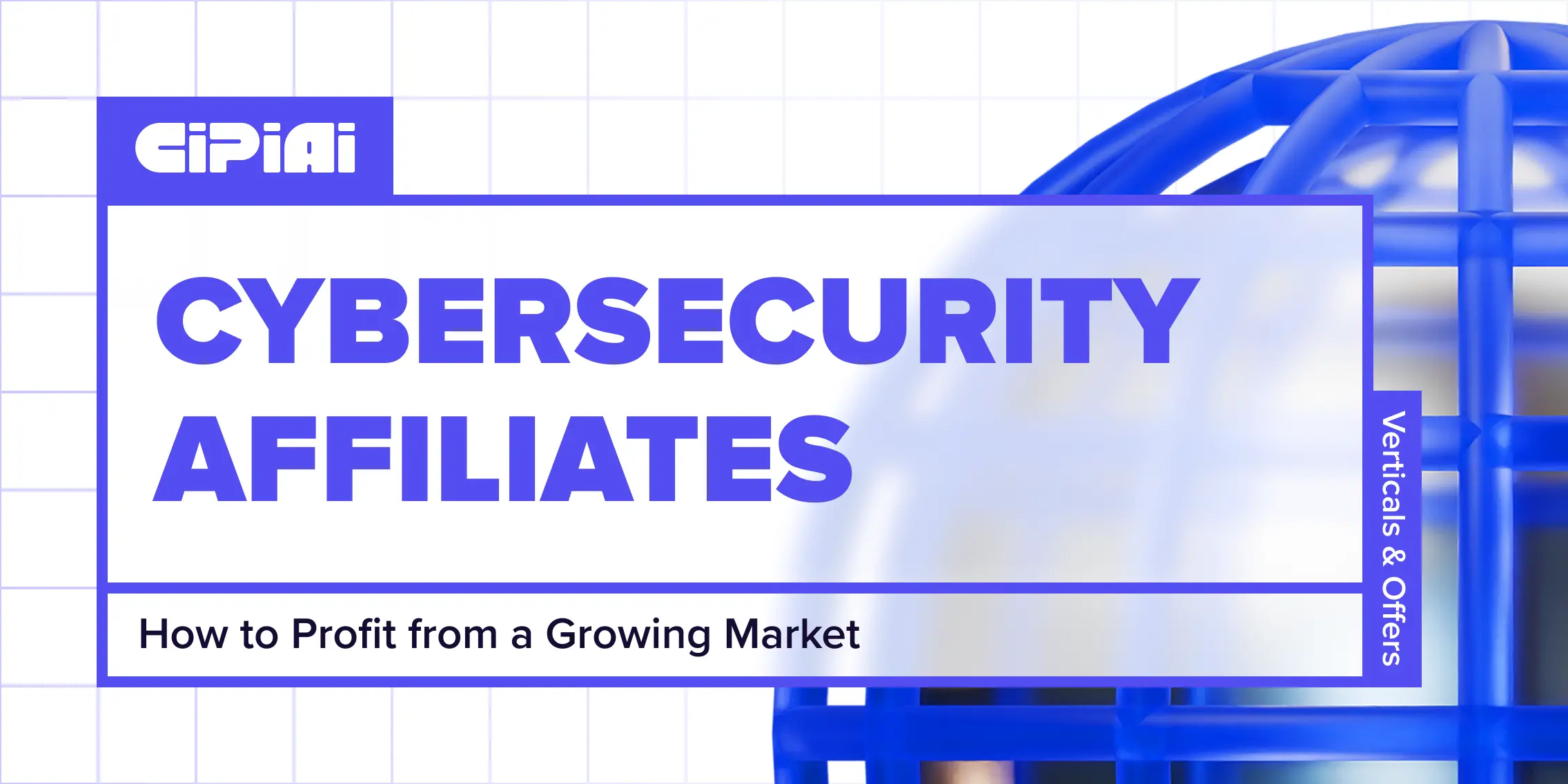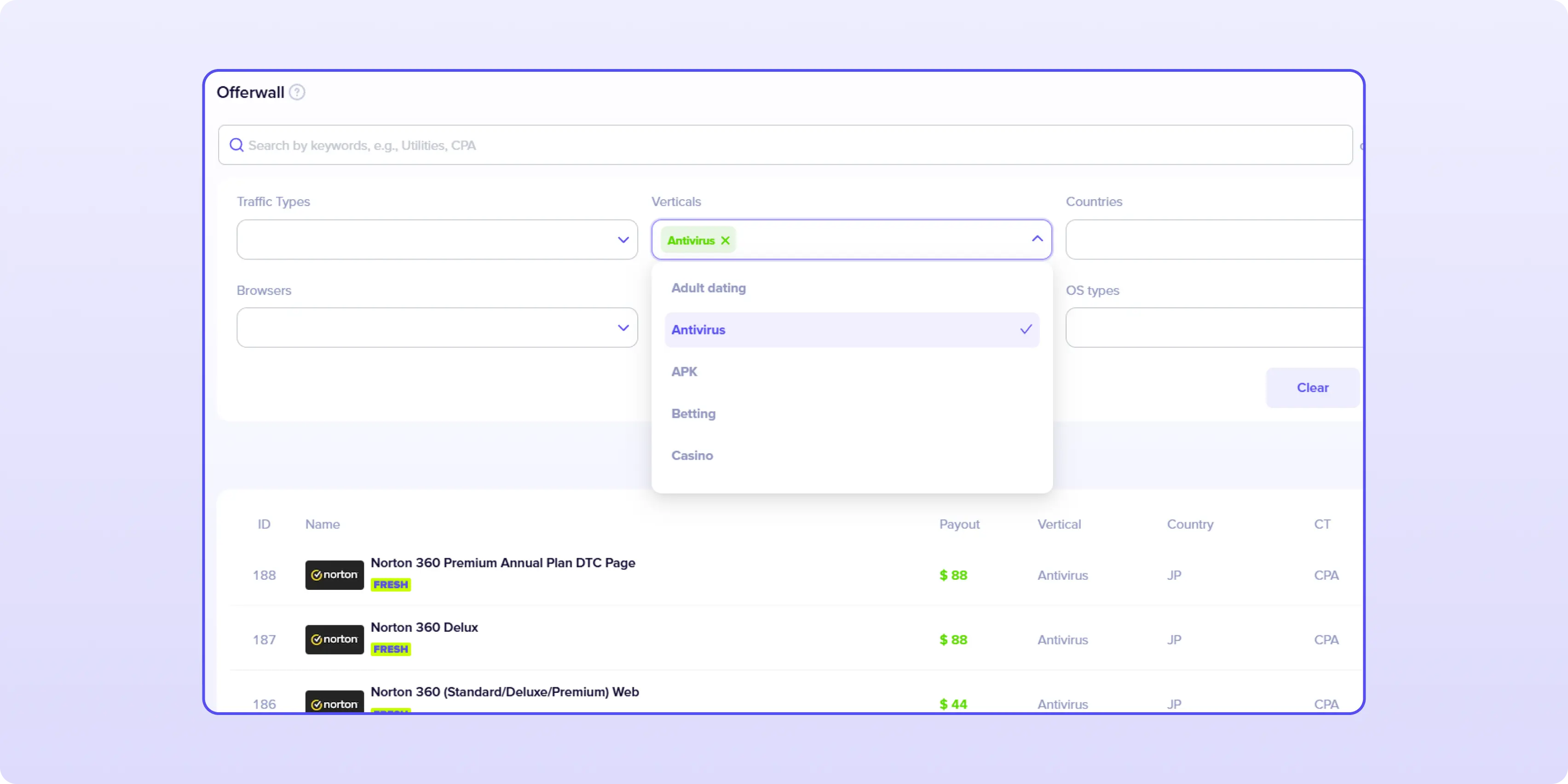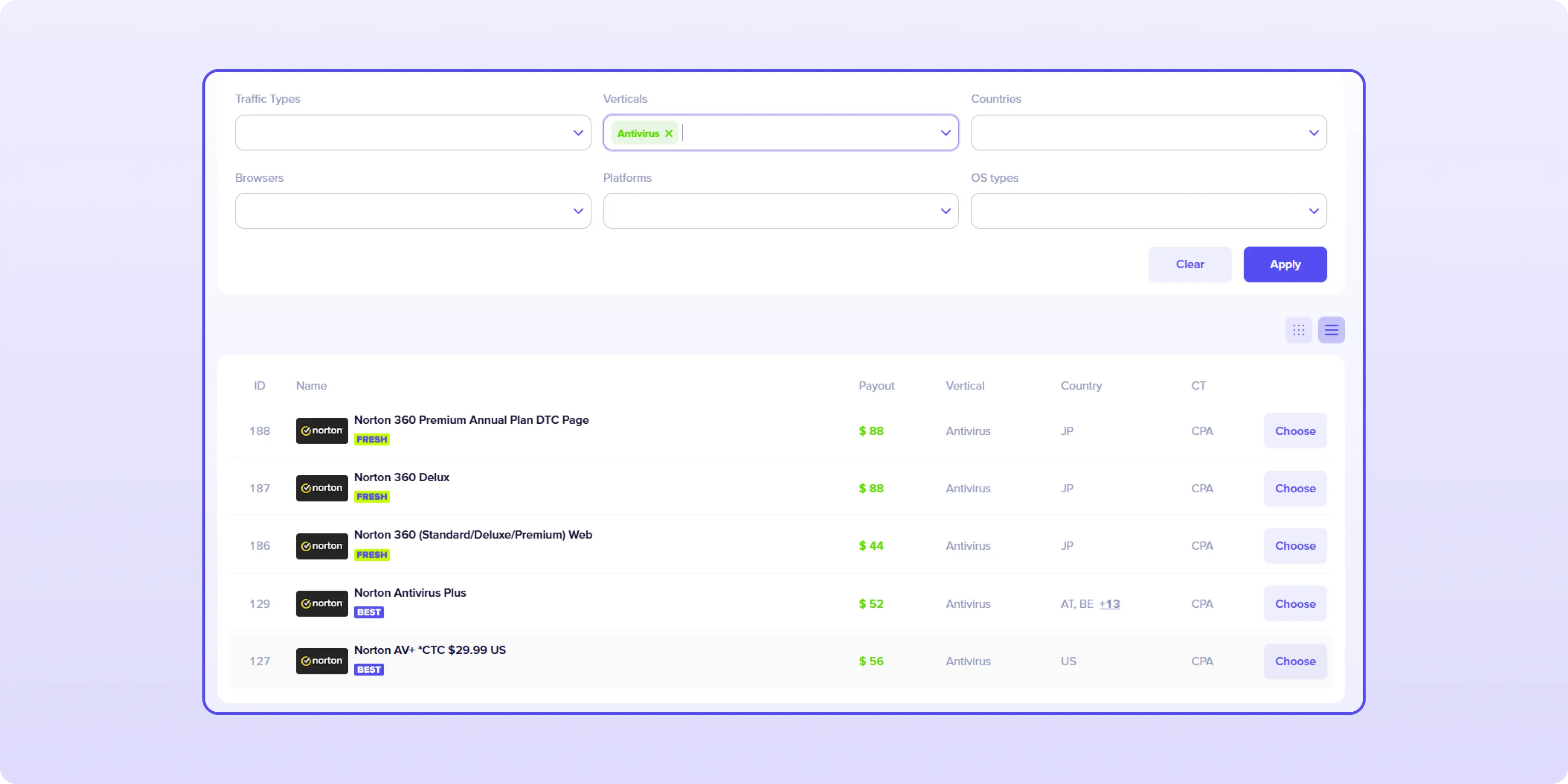
How to Promote VPN Offers in 2026
Looking to run VPN affiliate campaigns in 2026? Discover the best traffic sources, real GEOs, proven offers, and tips from insiders. CIPIAI helps you scale fast.

Cyberattacks, phishing, and AI-driven fraud are surging. In 2026, AI is involved in a growing number of ransomware and phishing operations — MIT Sloan and Safe Security report that roughly 80% of ransomware attacks are now powered by AI. Businesses and individuals are losing more: scammers stole $16.6 billion from consumers in 2024 in the U.S. alone, a 33% increase over the previous year. Meanwhile, identity fraud losses rose to $27.2 billion globally in 2024, up 19%.
The cybersecurity market is far more than just enterprise spend. Consumer security tools (antivirus, VPNs, identity protection) are now necessities in everyday digital life, and the market has grown into a multibillion-dollar engine.
In this article you’ll discover why this niche is especially lucrative in 2026, and how affiliates can turn the rising consumer demand into stable, recurring revenue.
The global cybersecurity market is estimated at USD 227.6 billion in 2025 — and it’s projected to rise to about USD 352 billion by 2030, with a CAGR of ~9.1 %. This projection reflects growing investment not just from large corporations but also from SMBs and consumer segments who face rising threat exposure.
Key growth drivers include the increasing frequency and sophistication of cyberattacks — phishing, ransomware, AI-assisted threats which push both organizations and individuals to spend more on protection.
Another major driver is the rapid adoption of IoT devices. The number of connected devices is growing into the tens of billions globally, creating new attack surfaces that are often underprotected.
Finally, regulatory pressure is rising worldwide — data protection laws, mandatory breach reporting, standards for device security — and that forces more spending to comply and avoid fines.
Consumer cybersecurity is one of the few niches that combines steady demand, recurring revenue, and high advertiser budgets — which makes it uniquely attractive for affiliates.
Most antivirus and identity-protection products run on annual or monthly subscriptions. Auto-renewal rates are high — which means one successful conversion can pay out for months, sometimes years. For affiliates, this creates a semi-passive income stream rather than a one-time CPA payout. The longer a user stays subscribed, the higher the effective EPC (earnings per click).
Unlike niches with a single product type, cybersecurity includes antivirus suites, VPNs, password managers, parental control tools, and full digital-safety bundles. This diversity allows affiliates to segment audiences: privacy-focused users respond to VPN + antivirus packages, while parents are interested in family safety plans. This matching of offer to user intent raises CR (conversion rate) and LTV.
Tier-1 GEOs (US, UK, DE) offer the highest payouts and large search volumes, but Tier-2/3 markets can often deliver better ROI because ad inventory is cheaper. Affiliates can scale horizontally — testing multiple regions with localized creatives — and pick the mix that gives the best EPC/ROI balance.
Cybersecurity is not seasonal. Unlike e-commerce niches that peak on Black Friday or Prime Day, malware campaigns, phishing attacks, and identity theft run all year — which means campaigns can be scaled steadily and not just in bursts. Affiliates can test, optimize, and compound their results over time without worrying about seasonality drops.
Cybersecurity offers affiliates a rare combination — high payouts, stable conversion potential, and recurring monetization. Affiliates who position themselves as trusted guides (through reviews, comparisons, or educational content) can secure a steady income stream that grows month after month.
If you want to promote antivirus and cybersecurity products, CIPIAI is the fastest way to get started.
CIPIAI gives affiliates direct access to top-tier security advertisers and other premium providers. Working directly with advertisers means better EPC, stable tracking, and faster feedback on campaign performance.
1. Sign Up: Go to cipiai.com and create your free account. Registration takes a few minutes.
2. Get Verified: Fill in basic traffic source information so your account manager can approve you quickly.
3. Browse Offers: Inside the dashboard, use the category filter to find “Antivirus”.

4. Apply to Offers: Choose the brand you want to promote and request access if it’s a private offer.

5. Grab Tracking Links: Once approved, generate your tracking link, set up postback (if needed), and start testing traffic.
6. Monitor & Optimize: Use real-time stats to track EPC, CR, and ROI. Scale the offers that perform best.
Having everything in one place — tracking, payouts, GEO targeting, and creative assets — lets affiliates move fast. Weekly payouts provide liquidity to reinvest in ads and scale campaigns aggressively.
CIPIAI isn’t just another network — it’s a one-stop launchpad for affiliates who want to build a cybersecurity vertical quickly and profitably.

Promoting cybersecurity offers is not just about pushing links — it’s about building trust and matching the right message to the right audience. Here’s how affiliates can turn this niche into a reliable revenue stream:
Long-form reviews, “Best Antivirus for 2025” roundups, and comparison charts work exceptionally well. Focus on search intent keywords such as “best antivirus for PC,” “Norton vs Avast,” or “do I need antivirus in 2026.” Google rewards content that answers real user questions — which means your articles can rank and bring in free, compounding traffic over time.
Search campaigns with brand + review keywords often convert at high CR because users are already in decision mode. Pair them with native ads (Taboola, Outbrain) or Reddit Ads targeting cybersecurity-related subreddits for top-funnel awareness. Always use compliant creatives — avoid scare tactics like “Your PC is infected!” to stay in good standing.
Cybersecurity has year-round demand, but some moments convert better: back-to-school (students setting up laptops), holiday season (when scams spike), or global data privacy days. Running promotions around these events can give CTR a healthy boost.
Consumers are skeptical — so your landing pages should feature trust badges, AV-Test/AV-Comparatives results, screenshots of clean interfaces, and real user testimonials. The more credible your page looks, the higher your EPC will be.
Don’t just sell antivirus — recommend bundles that include VPN, password manager, and identity protection. This not only increases average order value (AOV) but also positions you as a trusted advisor helping users “solve the whole problem” rather than just buying one tool.
Cybersecurity offers reward affiliates who combine education, timing, and trust. Mix organic and paid traffic, use data to optimize, and position yourself as a go-to source for digital safety advice — and your conversions will reflect that authority.
Absolutely. Cybersecurity demand is accelerating due to AI-driven phishing, ransomware, and identity theft. Consumers are more aware of online risks and willing to invest in premium solutions for peace of mind. Affiliates who provide educational, trust-building content (reviews, threat guides, side-by-side comparisons) can see strong EPC and stable recurring revenue.
Most networks, including CIPIAI, provide multiple options:
Tier-1 markets like the US, UK, Germany, and Canada offer the highest payouts and usually the most stable CR. However, Tier-2 and Tier-3 GEOs — such as LATAM, Eastern Europe, and parts of Asia — often provide cheaper clicks and less competition, making them a goldmine for affiliates who localize their creatives and landers. Testing multiple GEOs is key to finding the best EPC/ROI balance.
Always follow advertiser and network guidelines. Use approved creatives or pre-landers, avoid fake virus alerts (“Your PC is infected!” pop-ups), and don’t use aggressive fearmongering that might violate ad platform policies. CIPIAI account managers can help you review funnels before launch to keep campaigns fully compliant and sustainable.
Copyright © 2026. Bisdev Solutions Limited
All rights reserved